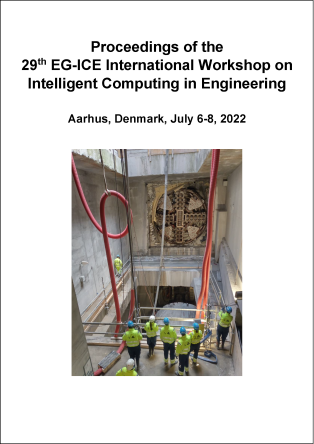Proceedings of the 29th EG-ICE International Workshop on Intelligent Computing in Engineering
Synopsis
This publication is the Proceedings of the 29th EG-ICE International Workshop on Intelligent Computing in Engineering from July 6-8, 2022. The EG-ICE International Workshop on Intelligent Computing in Engineering brings together international experts working on the interface between advanced computing and modern engineering challenges. Many engineering tasks require open-world resolution of challenges such as supporting multi-actor collaboration, coping with approximate models, providing effective engineer-computer interaction, search in multi-dimensional solution spaces, accommodating uncertainty, including specialist domain knowledge, performing sensor-data interpretation and dealing with incomplete knowledge. While results from computer science provide much initial support for resolution, adaptation is unavoidable and most importantly, feedback from addressing engineering challenges drives fundamental computer-science research. Competence and knowledge transfer goes both ways.
Chapters
-
Proceedings of the 29th EG-ICE International Workshop on Intelligent Computing in EngineeringFrontmatter and Backmatter
-
Development of an Ontology for the Representation of Firefighters’ Data Requirements during Building Fire Emergencies
-
MVDLite: a Fast Validation Algorithm for Model View Definition Rules
-
Modeling and Validating Temporal Rules with Semantic Petri-Net for Digital Twins
-
A Comprehensive Data Schema for Digital Twin Construction
-
Requirements for Event-driven Architectures for Open BIM Collaboration
-
Uncertainty and Sensitivity Analysis of Building Integrated Photovoltaics
-
Semantic Segmentation of Building Point Clouds based on Point Transformer and IFC
-
A Redundancy-free IFC Storage Platform For Multi-model Scenarios based on Block Hash
-
Real-Time Noise Sensing at Construction Sites based on Spatial Interpolation for Effective Reduction Measures
-
Enabling Federated Interoperable Issue Management in a Building and Construction Sector
-
IM2DR: Incentive Based Multi-tier and Multi-agent Approach for Demand Response in Electricity Market with Reinforcement Learning
-
Integrated Data-driven and Knowledge-based Performance Evaluation for Machine Assistance in Building Design Decision Support
-
Analyzing Operation Logs of Nuclear Power Plants for Safety and Efficiency Diagnosis of Real-Time Operations
-
Reinforcement Learning for Active Monitoring of Moving Equipment in 360-Degree Videos
-
A Digital Twin-driven Deformation Monitoring System for Deep Foundation Pit Excavation
-
Design and validation of a mobile structural health monitoring system based on legged robots
-
An Efficient and Resilient Digital-twin Communication Framework for Smart Bridge Structural Survey and Maintenance
-
Optimizing IFC-structured Data Graph for Code Compliance Checking
-
Cross Domain Matching for Semantic Point Cloud Segmentation based on Convolutional Neural Networks
-
End-to-end GRU Model for Construction Crew Management
-
Computation of Ranges in Interval-based Constraint-Geometry of Building Models
-
Linking Early Design Stages with Physical Simulations using Machine Learning; Structural Analysis Feedback of Architectural Design Sketches
-
Automated Qualitative Rule Extraction based on Bidirectional Long Short-Term Memory Model
-
Factors Contributing to Measurement Uncertainty of HVAC-enabled Demand Flexibility in Grid-interactive Commercial Buildings
-
The Role of Simulation in Digital Twin Construction
-
Leveraging Textual Information for Knowledge Graph-oriented Machine Learning: A Case Study in the Construction Industry
-
Reconstruction of Wind Turbine Blade Geometry and Shape Matching of Airfoil Profiles to Point Clouds
-
Nonintrusive Behavioral Sensing and Analytics for Supporting Human-Centered Building Energy Efficiency
-
Platology: A Digital Twin Ontology Suite for the Complete Lifecycle of Infrastructure
-
A Framework for Virtual Prototyping-Based Design of Operator Support System for Construction Equipment
-
Integration of Wave-Based Non-Destructive Survey Results into BIM Models
-
SFS-A68: a Dataset for the Segmentation of Space Functions in Apartment Buildings
-
A Multi-Scenario Crowd Data Synthesis Based On Building Information Modeling
-
New Ways of Data Governance for Construction? Decentralized Data Marketplaces as Web3 Concept just around the Corner
-
Self-supervised Learning Approach for Excavator Activity Recognition Using Contrastive Video Representation
-
Design and Development of Heritage Building Information Model (HBIM) Database to Support Maintenance
-
Point Cloud-Based Concrete Surface Defect Semantic Segmentation Using Modified PointNet++
-
Evaluating the Performance of Deep Learning in Segmenting Google Street View Imagery for Transportation Infrastructure Condition Assessment
-
Fake it till you make it: Training Deep Neural Networks for Worker Detection using Synthetic Data
-
BIM Standards and Classification Systems in Data Validation
-
BIM-based Fall Hazard Ontology and Benchmark Model for Comparison of Automated Prevention through Design Approaches in Construction Safety
-
Automating the Estimation of Productivity Metrics for Construction Workers Using Deep Learning and Kinematics
-
Trajectory Prediction: A Review of Methods and Challenges in Construction Safety
-
A Critical Review on Methods for the Assessment of Trainees' Performance in Virtual Reality-based Construction Safety Training
-
Automated Construction Payment Using Blockchain-Enabled Smart Contracts and Building Information Modelling

